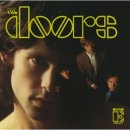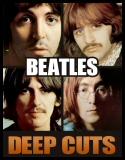Music Home / Entertainment Channel / Bullz-Eye Home
 Buy your copy from Amazon.com
Buy your copy from Amazon.com
| The Doors: The Doors Released: 1967 |
The true test of any album’s greatness lies in its longevity – how fresh and brilliant does it still sound five, 10, 20 years later? How about 40? There are few albums in rock history that stand the test of time like the 1967 eponymous debut from the Doors. From Jim Morrison’s poetic and shamanic vocals to Robby Krieger’s artfully bluesy guitar lines and the jazzy flourishes of drummer John Densmore and keyboardist Ray Manzarek, the Doors’ debut album remains a groundbreaking work.
To mark the 40th anniversary of the its release, the band and Rhino Records have gone back and not only remastered the album, but have endeavored to restore lost elements from the recording process to make it as it was originally intended to be heard. Original engineer/producer Bruce Botnick was alerted in 2003 by a Brigham Young University music professor that the album was running slow and a half key flat. Botnick has gone back and fixed the mix and there’s no denying the new version sounds incredibly crisp. The four-track masters were transferred to Pro Tools HD and mixed on the latest state-of-the-art gear. Densmore’s snare in particular really rings out. Likewise, the jam from “Light My Fire” soars to an all-time high. As always, the length of the seven-minute single demonstrates that the Doors would not be constrained by conventional dictates and were actually one of the forerunners of the jam band.
Whether anyone but the most die-hard of audiophiles will be able to really distinguish between the new version of the album and the old one is debatable, but there are other changes that Doors fanatics will want to get in on. Jim’s original vocal from “Break on Through” is now restored, for instance, so that the listener can actually hear him sing “she gets high,” a line that was censored out by nervous label execs due to morality concerns. There are also instances throughout the album where Krieger and Manzarek have extra parts restored that were not included on the original release, such as in “Soul Kitchen.” Finally, Mr. Mojo Risin’ is now allowed to get down on the climactic section of “The End,” with rhythmic use of the “f”-word as in live versions of the song.
Then there’s the three bonus tracks – two versions of “Moonlight Drive” that differ from the one that was released on the band’s second album, Strange Days, and a version of “Indian Summer” (which wasn’t released until the band’s fifth album Morrison Hotel) featuring a Morrison vocal from 8/19/66. Jim’s vocal on the first bonus version of “Moonlight Drive” has a dreamy quality to it, Ray’s keys are extra funky and Krieger’s slide guitar has a brilliantly bubbly quality. The second version is a little snappier and Krieger’s playing is a little more standard, but still hot. The tracks treat the listener to an inside view of a potent collective creativity, as the band experiments with different approaches rather than just going for the same old thing.
~Greg Schwartz






